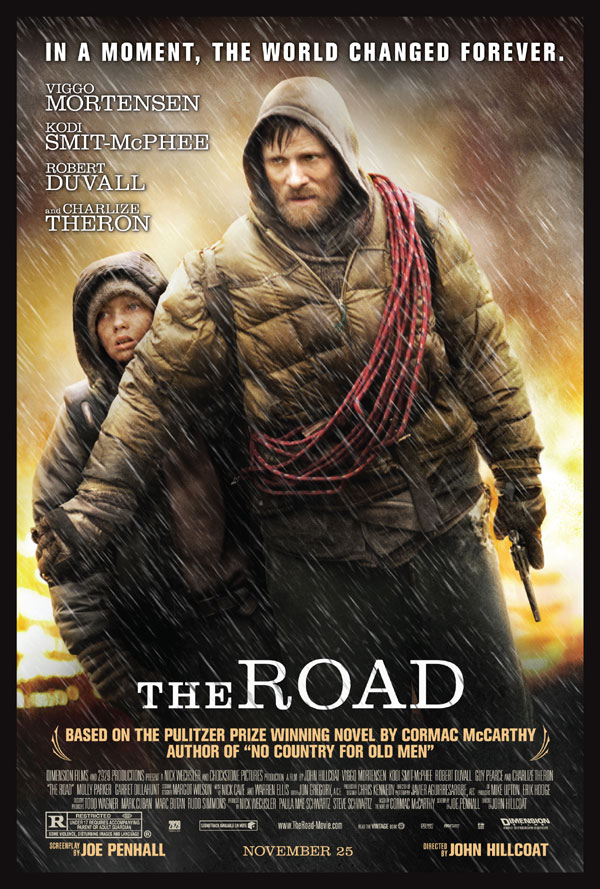I’ve gotten behind with reviews again, so I’ve got a few to catch up on so that I can get to the all-important best-of-the-year and best-of-the-decade recaps, for which I’m sure there is considerable demand.
Status: In limited release (opened 11/25/09)
Directed By: John Hillcoat
Written By: Joe Penhall
Cinematographer: Javier Aguirresarobe
Starring: Viggo Mortensen, Kodi Smit-McPhee
There have been some great examples of pitch-perfect adaptations lately: in 2009, we had Zack Snyder’s Watchmen, and in 2007 we had the Coen Brothers’ masterpiece No Country For Old Men. The latter has particular relevance to John Hillcoat’s The Road, as they are both based on books by Cormac McCarthy. And where the film version of The Road falters—which it does, though infrequently—it’s in the cases where it eschews the model established by the Coens in their matter-of-fact earlier adaptation. The poster I’ve selected at left is a good example; it proclaims that In a Moment, The World Changed Forever, and if you’ve read McCarthy’s novel, you know that this is really not at all what it is about. That’s movie marketing for you, though.
What it is about is survival, and it’s pretty narrowly focused on it. It takes place in a post-apocalyptic world, though the specifics of the apocalypse are never described and are never shown, other than a few brief flashbacks of how it affected one family. The world in which The Road takes place is post-apocalyptic because it just is, not unlike how Anton Chigurh in No Country is evil just because he’s evil, without explanation or rumination on the hows and the whys of it. This, to me, is the most effective aspect of McCarthy’s writing; his tales focus on emotions and primal instincts, and often on the potential for darkness in men’s souls, but they do so without commentary on these matters, preferring to accept them as facts of the world that must be dealt with and don’t necessarily demand further explanation than that. (His gimmicky lack of punctuation, on the other hand, only serves to annoy me… but I’ll digress because that’s outside the scope of my topic here.)
The film, as the book, is about an unnamed Man and his Boy—the always-reliable Viggo Mortensen and the impressive young Kodi Smit-McPhee, respectively—as they travel through a barren gray wasteland. They collect and hoard food and supplies as they find them, carrying all of their possessions in a cart that they push along as they go, convinced that if they could only reach the shore, they’d find something worth surviving for. Along the way, they encounter a few other survivors, all of whom are depicted by impressively heartfelt cameo appearances; Robert Duvall‘s and Michael Kenneth Williams‘ performances particularly resonate. There’s also Charlize Theron, who shows up in the infrequent aforementioned flashbacks, and provides an extra bit of emotional strife to an already-gloomy story.
That ever-present gloom, I think, is the biggest thing holding The Road back. It’s about a father who loves and wants to protect his son at all costs, yes, but more than that it’s about a world without hope, and it does almost nothing to make a case in defense of hope, or even to suggest that hope is a thing worth having. It’s bleak from its first frame to its last, with little respite from the singularity of its emotional impact. It has very little—if any—”arc.” It’s effective at conveying this gloom, though, thanks to the thoroughly heart-wrenching performances from its two leads, but also thanks to some really impressive special effects. They’re the kind that create a believable world and thrust you into it without ever drawing attention to themselves to take you out of it.
Joe Penhall’s screenplay does a good job of conveying the tone of Cormac McCarthy’s book, and is at its best when it remains true to its source material. It commits the all-too-common sin, though, of literalizing subtle thematic elements from the novel, the most glaring being a motif about “carrying the fire” (you’ll see what I mean). Overall, though, this is a respectable adaptation, in line with those previous greats I mentioned at the start of this review. The Road isn’t quite good enough to stand beside Watchmen or No Country, though, but it’s not the fault of the adaptation process for the most part. Rather, the story itself that this movie is based upon simply isn’t one that lends itself particularly well to a film adaptation in the first place (and again, I’ll restrain myself from getting into my opinions of how it works as a book to begin with). It effectively conveys sadness, but without much of a discernible message or point to be made behind it. What it does it does fairly well, though; it’s just that what it does isn’t something I think most audiences would be particularly drawn to.




